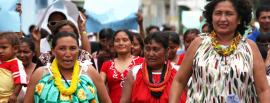
Things are approaching a crisis point in the long battle of wills between Venezuela and the White House. Juan Guaidó, president of the opposition-controlled National Assembly, swore himself in as the country’s “interim president” before a crowd of tens (by . . .
Read more ›
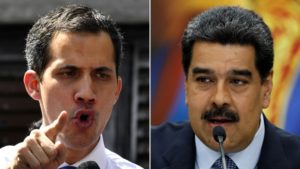
This statement was issued by the PRT, Mexican section of the Fourth International, on 23 January 2019.
The Workers’ Revolutionary Party (PRT) stands emphatically against the new attempted coup d’état and imperialist intervention against Venezuela. In an open and cynically orchestrated . . .
Read more ›

Collapsing wages, food shortages, and rampant inflation have led to growing hunger and desperation in Venezuela. Recent videos illustrate just how desperate the situation has become, as hungry people chase down livestock in the fields to butcher it for its meat, or skin dogs and cats on the streets of Caracas. Violent food-related protests have erupted in various cities around the country, and the looting of grocery stores is becoming more and more widespread. Meanwhile, thousands of Venezuelans are flooding across the borders into neighboring countries.
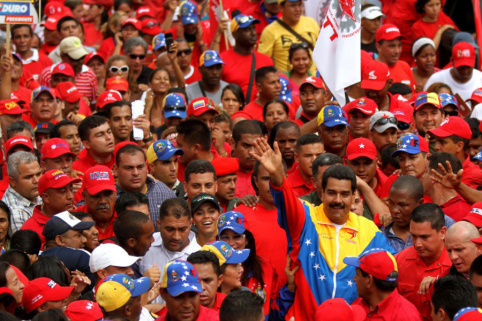
The political crisis that has been shaking Venezuela for months is at the heart of a war of information and propaganda, which is even inviting itself, albeit for other purposes, into the French political debate. Beyond binary discourses, we wanted to take the risk of complexity with Fabrice Andreani, doctoral student in Lyon-II University, who is working on the Bolivarian revolution. [CQFD]
Interview with Carlos Carcione
.j.jpg)
Following recent elections that were widely boycotted, a Constituent Assembly charged with rewriting the Venezuelan constitution met in early August. Venezuelan President Nicolás Maduro called for the Constituent Assembly in May, proposing it as a solution to the crisis that Venezuela has faced in recent years. The U.S., the right-wing opposition in Venezuela and the Washington's European and Latin American allies denounced the Constituent Assembly as an undemocratic power grab. When the "Constituent" convened, the Trump administration announced new sanctions against Venezuela.

On Sunday 30 July, so-called elections took place to a so-called Constituent Assembly in Venezuela. It is important, for the future, the revolution, and democracy, not to fool ourselves about the meanings of the words being used here.
For all Venezuelans, there can be no doubt: what was elected today has nothing in common with a sovereign constituent assembly. By “a sovereign constituent assembly.” we mean one which exercises power.
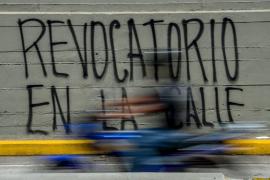
The Bolivarian revolution led by Hugo Chavez from 1999, opened a new chapter in the global struggle for social justice. For anti-capitalists across the world, his ‘21st century socialism’ pointed ahead to a new kind of power, defined in the Bolivarian Constitution as “participativa y protagonista” – a participatory democracy in which the people were the active subjects.
It is hard to reconcile that hope with the realities of Venezuela today. The spokespersons of the new State continue to proclaim their revolutionary credentials. Yet they oversee a society in profound and worsening crisis, where hunger has reappeared in a country which just four years ago was congratulated by the U.N. for its virtual elimination of extreme poverty. The right wing media – nationally and internationally – have taken great delight in publishing photographs of food queues marshalled and overseen by armed National Guards. The supporters of Chavismo instinctively refuse to believe the images. But the social crisis they symbolize is real.
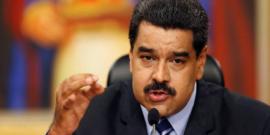 In recent weeks, a number of Venezuelan specialists on the left side of the political spectrum have published and posted pieces that place them in an anti-Chavista, “ni-ni” position that consists of “a plague on both your houses” with regard to Maduro and the Venezuelan opposition. Certainly, at this moment the Chavistas are playing hard ball; the options available to them are limited.
In recent weeks, a number of Venezuelan specialists on the left side of the political spectrum have published and posted pieces that place them in an anti-Chavista, “ni-ni” position that consists of “a plague on both your houses” with regard to Maduro and the Venezuelan opposition. Certainly, at this moment the Chavistas are playing hard ball; the options available to them are limited.
Venezuela is torn between the destabilising attempts of the right-wing, the limits of the Bolivarian process and the possibility the working class and the popular movements will advance the [revolutionary] project, [but] not without tensions and contradictions.
“Today the counter-revolutionary Right is reactivating itself,” according to long-time Venezuelan revolutionary Roland Denis, “taking advantage of the profound deterioration that this slow revolutionary process is suffering.
 The inner-city parish of La Vega sits in the lush mountain terrain of Western Caracas. Roughly 130,000 poor residents are cordoned off sociologically from nearby El Paraíso, a wealthy neighborhood that supplies the clients for the upscale shopping center that separates the two communities. In La Vega, the bottom 20 percent of households live on US$125 per month, while the average family income is $US409.
The inner-city parish of La Vega sits in the lush mountain terrain of Western Caracas. Roughly 130,000 poor residents are cordoned off sociologically from nearby El Paraíso, a wealthy neighborhood that supplies the clients for the upscale shopping center that separates the two communities. In La Vega, the bottom 20 percent of households live on US$125 per month, while the average family income is $US409.
Venezuela, a moderately prosperous nation with rosy relations with both the United States and global capital, was an unlikely setting for a socialist renaissance. The 1998 election of Hugo Chávez appeared to be nothing more than a parliamentary victory for a bombastic social democrat, surprising but hardly epochal.
ON MARCH 24, 2007, Venezuela’s President Hugo Chavez announced to a gathering of about 3,000 supporters that he was creating a Unified Socialist Party of Venezuela (PSUV). The following interview was conducted (by the Venezuelean group aporrea) on April 13, 2007, with Orlando Chirino, national organizer of the UNT (Union Nacional de Trabajadores—National Union of Workers). Chirino is the leader of C- Cura–the United Autonomous Revolutionary Class Current—within the PSUV.




.j.jpg)

 In recent weeks, a number of Venezuelan specialists on the left side of the political spectrum have published and posted pieces that place them in an anti-Chavista, “ni-ni” position that consists of “a plague on both your houses” with regard to Maduro and the Venezuelan opposition. Certainly, at this moment the Chavistas are playing hard ball; the options available to them are limited.
In recent weeks, a number of Venezuelan specialists on the left side of the political spectrum have published and posted pieces that place them in an anti-Chavista, “ni-ni” position that consists of “a plague on both your houses” with regard to Maduro and the Venezuelan opposition. Certainly, at this moment the Chavistas are playing hard ball; the options available to them are limited. The inner-city parish of La Vega sits in the lush mountain terrain of Western Caracas. Roughly 130,000 poor residents are cordoned off sociologically from nearby El Paraíso, a wealthy neighborhood that supplies the clients for the upscale shopping center that separates the two communities. In La Vega, the bottom 20 percent of households live on US$125 per month, while the average family income is $US409.
The inner-city parish of La Vega sits in the lush mountain terrain of Western Caracas. Roughly 130,000 poor residents are cordoned off sociologically from nearby El Paraíso, a wealthy neighborhood that supplies the clients for the upscale shopping center that separates the two communities. In La Vega, the bottom 20 percent of households live on US$125 per month, while the average family income is $US409.